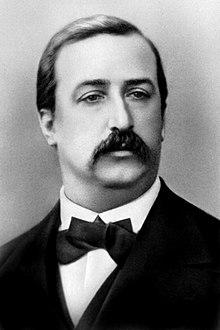
Back Aleksandr Borodin Afrikaans Alexander Borodin AN ألكسندر بورودين Arabic الكسندر بورودين ARZ Aleksandr Borodín AST Aleksandr Borodin Azerbaijani الکساندر برودین AZB Бородин Александр Порфирьевич Bashkir Аляксандр Парфіравіч Барадзін Byelorussian Александър Бородин Bulgarian

Alexander Porfiryevich Borodin (Russian: Александр Порфирьевич Бородин, romanized: Aleksandr Porfiryevich Borodin[a], IPA: [ɐlʲɪkˈsandr pɐrˈfʲi rʲjɪvʲɪtɕ bərɐˈdʲin] ⓘ;[2] 12 November 1833 – 27 February 1887)[3] was a Romantic composer and chemist of Georgian-Russian extraction. He was one of the prominent 19th-century composers known as "The Five", a group dedicated to producing a "uniquely Russian" kind of classical music.[4][5][6] Borodin is known best for his symphonies, his two string quartets, the symphonic poem In the Steppes of Central Asia and his opera Prince Igor.
A doctor and chemist by profession and training, Borodin made important early contributions to organic chemistry. Although he is presently known better as a composer, he regarded medicine and science as his primary occupations, only practising music and composition in his spare time or when he was ill.[7] As a chemist, Borodin is known best for his work concerning organic synthesis, including being among the first chemists to demonstrate nucleophilic substitution, as well as being the co-discoverer of the aldol reaction. Borodin was a promoter of education in Russia and founded the School of Medicine for Women in Saint Petersburg, where he taught until 1885.
- ^ "Russian – BGN/PCGN transliteration system". transliteration.com. Retrieved 2 December 2020.
- ^ English approximation of the surname: UK: /ˈbɒrədɪn/, US: /-diːn/ (Wells, John C. (2008), Longman Pronunciation Dictionary (3rd ed.), Longman, ISBN 978-1-4058-8118-0).
- ^ Old Style dates 31 October 1833 – 15 February 1887.
- ^ Abraham, Gerald. Borodin: the Composer and his Music. London, 1927.[page needed]
- ^ Dianin 1963, pp. 13, 329.
- ^ Cite error: The named reference
Oldaniwas invoked but never defined (see the help page). - ^ Podlech, Joachim (16 August 2010). ""Try and Fall Sick ..." – The Composer, Chemist, and Surgeon Aleksandr Borodin". Angewandte Chemie International Edition. 49 (37): 6490–6495. doi:10.1002/anie.201002023. ISSN 1433-7851. PMID 20715236.
Cite error: There are <ref group=lower-alpha> tags or {{efn}} templates on this page, but the references will not show without a {{reflist|group=lower-alpha}} template or {{notelist}} template (see the help page).